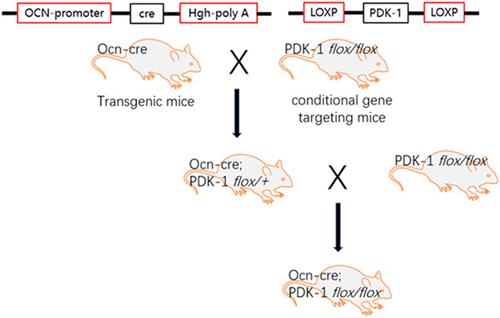当前位置:
X-MOL 学术
›
J. Cell. Physiol.
›
论文详情
Our official English website, www.x-mol.net, welcomes your
feedback! (Note: you will need to create a separate account there.)
Conditional knockout of the PDK‐1 gene in osteoblasts affects osteoblast differentiation and bone formation
Journal of Cellular Physiology ( IF 4.5 ) Pub Date : 2020-12-30 , DOI: 10.1002/jcp.30249 Yiguang Bai 1, 2 , Qiong Zhang 3 , Qiaoling Chen 4 , Quan Zhou 5, 6 , Yanan Zhang 5 , Zhuohua Shi 1 , Haibin Nong 1 , Mingfu Liu 1 , Gaofeng Zeng 3 , Shaohui Zong 1, 7
Journal of Cellular Physiology ( IF 4.5 ) Pub Date : 2020-12-30 , DOI: 10.1002/jcp.30249 Yiguang Bai 1, 2 , Qiong Zhang 3 , Qiaoling Chen 4 , Quan Zhou 5, 6 , Yanan Zhang 5 , Zhuohua Shi 1 , Haibin Nong 1 , Mingfu Liu 1 , Gaofeng Zeng 3 , Shaohui Zong 1, 7
Affiliation

|
Osteoblasts are the main functional cells of bone formation, and they are responsible for the synthesis, secretion, and mineralization of the bone matrix. Phosphatidylinositol‐3‐kinase/Akt is an important signaling pathway involved in the regulation of cell proliferation, death, and survival. Some studies have shown that 3‐phosphoinositide‐dependent protein kinase‐1 (PDK‐1) plays an important role in the phosphorylation of Akt. In the present study, an osteocalcin (OCN) promoter‐driven Cre‐LoxP system was established to specifically delete the PDK‐1 gene in osteoblasts. It was found that the size and weight of PDK‐1 conditional gene knockout (cKO) mice were significantly reduced. von Kossa staining and microcomputed tomography showed that the trabecular thickness, trabecular number, and bone volume were significantly decreased, whereas trabecular separation was increased, as compared with wide‐type littermates, which were characterized by a decreased bone mass. A model of distal femoral defect was established, and it was found that cKO mice delayed bone defect repair. In osteoblasts derived from PDK‐1 cKO mice, the alkaline phosphatase (ALP) secretion and ability of calcium mineralization were significantly decreased, and the expressions of osteoblast‐related proteins, runt‐related transcription factor 2, OCN, and ALP were also clearly decreased. Moreover, the phosphorylation level of Akt and downstream factor GSK3β and their response to insulin‐like growth factor‐1 (IGF‐1) decreased clearly. Therefore, we believe that PDK‐1 plays a very important role in osteoblast differentiation and bone formation by regulating the PDK‐1/Akt/GSK3β signaling pathway.
中文翻译:

成骨细胞中PDK-1基因的条件性敲除影响成骨细胞分化和骨形成
成骨细胞是骨形成的主要功能细胞,负责骨基质的合成、分泌和矿化。磷脂酰肌醇-3-激酶/Akt 是参与调节细胞增殖、死亡和存活的重要信号通路。一些研究表明,3-磷酸肌醇依赖性蛋白激酶-1 ( PDK-1 ) 在 Akt 的磷酸化中起重要作用。在本研究中,建立了骨钙素 (OCN) 启动子驱动的Cre-LoxP系统来特异性删除成骨细胞中的PDK-1基因。发现PDK-1的大小和重量条件基因敲除 (cKO) 小鼠显着减少。von Kossa 染色和显微计算机断层扫描显示,与以骨量减少为特征的宽型同窝仔相比,小梁厚度、小梁数量和骨量显着降低,而小梁分离增加。建立股骨远端缺损模型,发现cKO小鼠延迟骨缺损修复。在源自PDK-1 的成骨细胞中cKO小鼠碱性磷酸酶(ALP)分泌和钙矿化能力显着降低,成骨细胞相关蛋白、runt相关转录因子2、OCN和ALP的表达也明显降低。此外,Akt 和下游因子 GSK3β 的磷酸化水平及其对胰岛素样生长因子-1(IGF-1)的反应明显降低。因此,我们认为PDK-1通过调节PDK-1/Akt/GSK3β信号通路在成骨细胞分化和骨形成中发挥着非常重要的作用。
更新日期:2020-12-30
中文翻译:

成骨细胞中PDK-1基因的条件性敲除影响成骨细胞分化和骨形成
成骨细胞是骨形成的主要功能细胞,负责骨基质的合成、分泌和矿化。磷脂酰肌醇-3-激酶/Akt 是参与调节细胞增殖、死亡和存活的重要信号通路。一些研究表明,3-磷酸肌醇依赖性蛋白激酶-1 ( PDK-1 ) 在 Akt 的磷酸化中起重要作用。在本研究中,建立了骨钙素 (OCN) 启动子驱动的Cre-LoxP系统来特异性删除成骨细胞中的PDK-1基因。发现PDK-1的大小和重量条件基因敲除 (cKO) 小鼠显着减少。von Kossa 染色和显微计算机断层扫描显示,与以骨量减少为特征的宽型同窝仔相比,小梁厚度、小梁数量和骨量显着降低,而小梁分离增加。建立股骨远端缺损模型,发现cKO小鼠延迟骨缺损修复。在源自PDK-1 的成骨细胞中cKO小鼠碱性磷酸酶(ALP)分泌和钙矿化能力显着降低,成骨细胞相关蛋白、runt相关转录因子2、OCN和ALP的表达也明显降低。此外,Akt 和下游因子 GSK3β 的磷酸化水平及其对胰岛素样生长因子-1(IGF-1)的反应明显降低。因此,我们认为PDK-1通过调节PDK-1/Akt/GSK3β信号通路在成骨细胞分化和骨形成中发挥着非常重要的作用。











































 京公网安备 11010802027423号
京公网安备 11010802027423号